A year since the fatal shooting of three men and the wounding of several others on the Wismar/Mackenzie Bridge set off nearly a month-long protest, Linden and its people bear both the physical and emotional scars that continue to fuel a call for justice, which they say they are prepared to fight for all over again if they have to.
The reminders of July 18, 2012 are visible in the town. The burnt-out area near the bridge is still to be cleared and heaps
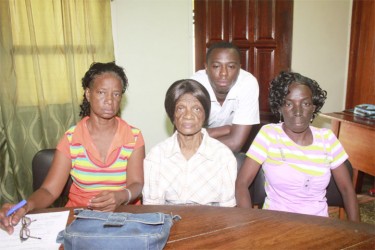
of sand are at the nearby site designated for the Linden Martyrs’ Monument Park commemorating the protest and three slain men.
Ron Somerset, 18, Shemroy Bouyea, 24, and Allan Lewis, 46, were fatally shot when police opened fire and discharged tear smoke at hundreds of protestors on the bridge on the evening of the first day of what was intended to be a five-day protest over the planned hike in electricity tariffs for the town.
A Commission of Inquiry (COI) into the shootings later found the police responsible for the deaths but said that in the circumstances, the discharge of ammunition was justified as the police were confronted by a hostile crowd and had no clear intention to kill or injure anyone.
In a recent visit by Stabroek News in the run up to today’s observances to the town, normalcy reigned as residents went about their daily routines. But for the relatives of the slain as well as some of the survivors of the shooting, normal now means living their loss and the reality that those responsible are yet to be identified and punished.
For Lewis’ 80-year-old mother Daphney Lewis, his sisters Monica Casctang and Denise Lewis, and his son Rodwell Lewis, speaking about him was very emotional.
Daphney, in a shaky voice, said that every day for the last year has been rough for her. She still cries a lot whenever she thinks about her son, who asked her to keep his share of the cook up he helped make before he left their Wisroc Housing Scheme home. It was his favourite food and he left without eating his full share, she said.
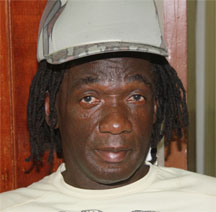
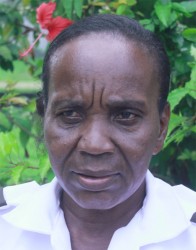
According to the elderly woman, as night fell she became worried because he hadn’t returned home. She said that around that time, a crowd was building up in front of their home. It was shortly after that there was news of a shooting but there were no details. Her sister, she said, called inquiring about Lewis and it was then that Daphne was told that there were reports that he had been shot.
The woman said that she and other relatives inquired from people around but no one knew anything. A relative later confirmed that it was him, after seeing his body at the hospital.
Her family did not know how to tell her that the fourth of her six children had died, but she suspected from their behaviour that something was indeed wrong. They then broke the news.
Her eyes welling with tears, Daphney said that she and her family have to see justice. “I desire justice,” she stressed, after pausing to compose herself.
Casctang was also emotional as she spoke while Denise stood nearby with tears flowing from her eyes.
According to the members of Lewis’ family, it is hard and those who fired the shots that killed their loved ones should have a feel of what they are going through. They said that they would usually meet with the relatives of the other dead and with the injured and they all agreed that they need justice. “We all have to get
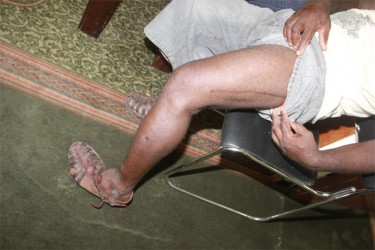
justice because it was unfair. It was just a normal protest and a normal protest didn’t call for this,” a distraught Casctang said.
Rodwell said that it has been hard for him since his father died but he knew that he had to complete his studies at the University of Guyana. In October, he will be graduating with a Diploma in Mechanical Engineering and sees this step in his life as a tribute to his father.
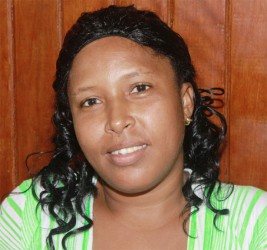
He said that things have been “different” as his role model and protector was no longer there. Rodwell, 21, said that despite all that had happened he has to be there for his younger brother, who is 19 years old. His brother, he said, is trying to cope with everything and understands that as a result of the loss some of his goals have to be put off.
The young man said that he doesn’t expect justice because of the country’s track record, which sees “the wicked always gets off.”
“I don’t think that we will ever get the full true justice that we deserve,” he added.
He said that at the time of the shooting he was in his dorms on campus when friends informed him that police were firing tear gas and that people were being shot. He said that he kept following up reports and he began hearing that persons had been killed. His mother later called him and informed him that his father had been among those shot and killed.
Jacqueline Bouyea said she missed her son Shemroy a lot. “….Mostly, when I am home in the night I does like seeing he in front of me,” the woman said, on the verge of tears. “I really, really miss my son.”
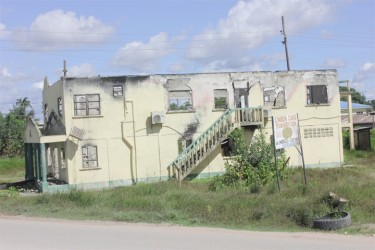
She said today she is off duty and she would spend the day reflecting and honouring her son. She said that she will be at the planned programme at the bridge and they will pay a visit to his gravesite.
Unlike others, she said she agreed with the compensation which was given but added that she wants the shooters to be brought before the court so that she and her family can get justice.
Stabroek News was unable to make contact with the family of Somerset.
Police had used loud speakers to urge the crowds to disperse. When their orders were not complied with, police began firing tear gas canisters. However from a vantage point of more than a quarter mile away, their targeting was off since the persons affected were not those on the bridge but those in the Linden Secretariat Compound.
Protestors recounted to this newspaper that sometime before 6pm, word spread that “black clothes policemen” were heading to the bridge way. As the ranks approached the bridge, the protestors walked towards them. Moments later, protestors
said that tear gas canisters were hurled at them and subsequently gunshots rang out.
Dozens were rushed to the nearby Linden Hospital where the trio was pronounced dead.
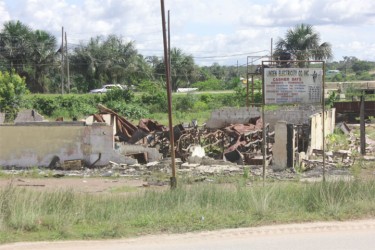
Police had said that they had to resort to using tear gas and later fired shotgun cartridges at protestors, after missiles were hurled at them—an account challenged by some of the injured and others present at the protest.
It was while police were clearing the bridge that fire broke out at the nearby Linmine Secretariat compound, which housed several offices, including those of the Guyana Revenue Authority, Linden Electricity Company Inc (LECI), the PPP/C’s regional office, the Linden Care Foundation, the Praise Tabernacle Assembly of God Church, Linmine Security and the training centre for the disabled. Most of the building was burnt flat.
Four trucks, including one transporting fuel that was eventually destroyed, were also set on fire at Wismar that night. In the days after the shootings, angry protestors blocked off the roads in the community preventing vehicles from travelling to areas such as Lethem.
Life changing
Rueben Bowen still hobbles about as a result of the gunshot wound he received to his left leg. The scars that were left by the doctors during their efforts to remove the bullet from his leg are testimony to the events that have changed his life forever.
“The day fresh to me like this morning,” he said, recounting the events. He left home around 8.30 that morning and headed to Blue Berry Hill to call out people for the protest. He said that he remembered telling the residents that the day would be a historic one.
The Silver City resident, who was 56 at the time of the shooting and had made his living selling bread and pastries, described the past year as a “lil rough.” In January, a doctor gave him a one year timeline for him to regain the full use of his foot. Bowen, a father of four, cannot put weight on the injured leg because it still pains. There is also steel still inside.
He was awarded $390,000 in compensation by the COI and the finding by commissioners that he could find something to do despite his injury shocked him. “I would like to say to Mr. [Lensley] Wolfe (Chairman of the COI) and all those who sat down on the inquiry that if them know that I could still find something fuh do, then why don’t they provide something for me to do?” he said, adding that with his injury he is basically disabled.
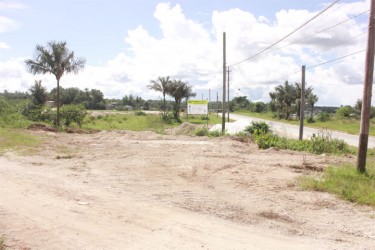
He said that he has not gotten enough justice and he stressed that he cannot move around and do his fatherly duties as he ought to. Once the police are responsible, he said, referring to the findings of the COI, “I think that the government should see that the people of Linden get justice. ’Cause giving us a lil piece of money is not justice.”
The commission did not conclusively identify any specific rank as having fired the fatal shots but singled out the action of one officer in its conclusions. For Bowen, justice is having those responsible for the killing and wounding go before the court and stand trial.
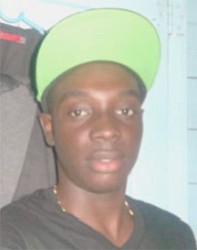
Despite his injury, Bowen said that should the government move to implement the tariff increase, “we will be there. If they come at least I know I will be there because I have 13 grandchildren and I know that we cannot afford a tariff like that without jobs.”
Alieshaw Barker was shot in her leg. As today approached, she was overcome with sadness and was reliving the events of a year ago. According to the mother of four, when she watches the families of those slain, tears comes to her eyes because they were all protesting for a just cause and acting under the constitution, which gives them the right to assemble and associate in matters concerning their interest.
She stressed that protesters were not violating anything or doing anything against the law. “We hadn’t guns, we hadn’t batons, we hadn’t nothing,” she said. On that day, she recalled, she was home sick with dengue fever and she had sent her 14-year-old son to the hospital to uplift some treatment for her.
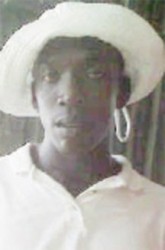
By 4 pm, he had not returned home. She decided to travel the 15 minutes journey to the bridge to find him. It was at that point she realised that it was a “fun day like” atmosphere there. She said that she went on to the bridge because she had heard that her son was on the other side.
According to Barker, the crowd was so thick she could not see far and it was around this time she heard gunshots. She said that someone who was hit fell in front of her and she noticed two crying children who appeared to be lost.
An emotional Barker said that she held the frightened children and made a decision to turn back and when she got in the centre of the bridge she was shot in the leg. She said that she couldn’t move her left leg. The gunfire, she recalled, lasted over 45 minutes. She said that because bullets were still flying, the only alternative she had was to get into a car to take her to Wismar Hospital. When she reached there, she said, the place was in darkness and there were no nurses or staff there.
Thereafter, she said, the driver made every effort to get her back over the bridge to Mackenzie Hospital but this was still impossible since shots were still being fired.
The woman said that she decided to go home with the bullet still lodged in her. She said she was bleeding badly and she attempted to clean the wound in the bathroom. Later, she said, a boat captain decided to leave his home and take her by boat to the Mackenzie shore. From there, she got into a taxi and at that point it was uncertain if she could actually make it to the hospital as there were reports of shots being fired along the Washer Pond road. When they reached the Five Corner, she said, they were greeted by rapid gunfire. She said that they ended up at the police station, where they asked the then commander Clifton Hicken for an escort to the hospital. Permission was granted. However, when they returned to the Five Corner, they were again met with gunshots and they returned to the police station. She said that they decided to make another attempt. They found an NCN van heading to the hospital and they decided to drive behind it. She said that when she got to the hospital, doctors were fighting to save Bouyea and Lewis. Somerset had already died, she said.
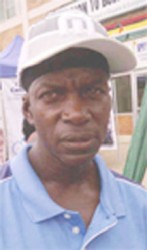
The hospital, she said, was chaotic. She was admitted and released the following afternoon. She said that the nurse who treated her made all efforts to remove the bullet, including using a scissors to clip it but was unsuccessful. She said an x-ray showed that it was five inches above the knee, two inches above a blood vessel and an inch near the nerve that could cripple her.
Barker told Stabroek News that it would be a serious surgery to have the bullet removed. She said that she had to relocate her children to Berbice as she had no one to look after them. And, she had to find $244, 000 to have the surgery done. This figure did not include the money to travel to Berbice to get it done or money to stay in the hospital. “I think that I was poorly compensated. I got $280,000 and I spend over $500,000…”, she said, while adding that among her expenses was the laser surgery she had to do. She was left with a dent in the area where she was shot and her gait has been affected.
The money she received from the COI she said had to be used to repay the money she had taken to pay for the surgery and other medical expenses. “I don’t think that they did a good job with the compensation. The government didn’t give us no justice,” she said, while adding that it is not only about July 18 but also those who were injured after them when the protest action continued.
She said all of her bills were submitted to the COI but their position was that at the time she was not earning as she was unemployed. The woman opined that under the present government they have no justice to get. She said that as a result of her injury, she still suffers from pain, especially when it rains.
Innocent people
Terry Peters, who lives at West Watooka, a short distance from where the shooting occurred, told Stabroek News that July 18 is going to be a day that Lindeners will never forget. The man said that never in his life did he imagine that such a tragedy would have befallen Linden.
“People protesting and police just come and shoot innocent people. Shooting innocent people just to kill,” he said, while adding that until now, there are persons who were injured who can’t even walk properly.
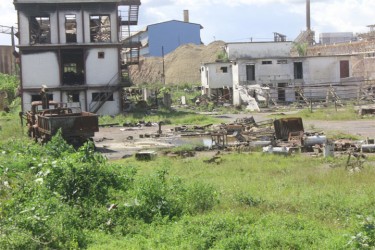
Earlier in the day, he had been part of the protest but he was at home when the tear gas was fired to disperse the hundreds of protesters and decided to leave when he began to feel the effects of the tear gas. “I had to run out from my house due to the tear gas cause the people dem deh by the bridge shooting tear gas till this side,” he said, adding that some of the canisters were dropping in front of his bridge. “People din running up de road and I couldn’t ah stay in there because it blowing to my house and I had to run out,” he added.
He said that there was plenty people there that day and some persons had decided to congregate underneath his home. He saw that when he decided to vacate his home, bullets were already being fired and the three residents had already been slain.
He said that when he got news of the shooting it sent “chills” through his body. He thought that the police would have used what he described as the “water can” –a reference to the water cannon.
A One Mile resident, who asked not to be named, said that he sustained two pellet wounds when police opened fire. He said that when he arrived at the bridge, he became uncomfortable when he saw the police “moving up and down and everything going wrong.”
He added that he eventually brought his sons home and they made plans to go back to the bridge later. “By time we reach home, we hear the big commotion and the shooting and the three persons. That upset the whole of Linden,” he said, while adding that everyone until now is still uncomfortable. He said everyone is affected, especially the students of the One Mile Primary School, which had been burnt down to the ground.
The resident said that while he cannot say what went wrong that day, he knew that “that is not nice for human consumption. That is not good… human being should not be treated like this.” He said that the town cannot recover from the tragedy in a hurry.
The man said that the days after the shooting were also hard as it was uncomfortable. He said that he had ventured onto the main road to see what was transpiring and police started firing shots, two of which grazed him. He said that the ranks were trying to clear residents off of the roadway when they opened fire.
He said it makes no sense saying anything to the police or the government in relation to this incident. He said that the best thing to do is to remain “humble.”
Today, he said, will be a normal day and he plans to go out and watch the proceedings that have been planned to commemorate the day.
Some victories
Regional 10 Chairman Sharma Solomon said that seeking justice is an ongoing process and that the residents are prepared to pursue it at all costs.
He remained both angry and disappointed that in modern Guyana three men would have lost their lives while standing up for their rights. To date, he noted, there is still a sense of wanting for justice for the actions of the police.
One year on, according to Solomon, the community is in a better position to move on as it is united and stronger in understanding the challenges and better prepared to anticipate how to deal with them. “I believe that people will not forget though they are prepared to move on now to deal with the challenges that they are faced with,” he said, while adding that many underlying issues that led to the protests still need to be addressed.
APNU Region 10 MP Vanessa Kissoon added that emotions are rising again among the townspeople, particularly over the failure by the government to honour the terms of the agreement that was brokered to end the protests.
Kissoon last month successfully moved a motion calling in the National Assembly calling on the government to honour its August 21, 2012 agreement with the Region 10 Regional Democratic Council, almost one year following its signing and with none of the committees having completed their work.
Despite this state of affairs, she said that over the year there have been some victories, including the findings of the COI that the police was responsible for the death of the three men. “I really appreciated the honesty in that area though I must say I am disappointed with the compensation itself because we still are not aware of the criteria that were used to come up with this compensation,” she explained.
Kissoon, who believes more victories lay ahead, added that the people would be more satisfied if justice is served, whereby the appropriate penalties are handed down to the police.
For her, as the anniversary approached, the memories of the events of the fateful day made her very emotional. She was the person holding Lewis “with his blood dripping,” she recalled, adding that later she was the person at the hospital calling relatives of the dead and injured. “I was there. I was there on that bloody Wednesday. I was there in the bloody hospital and I was there even when shots were firing,” she said.









